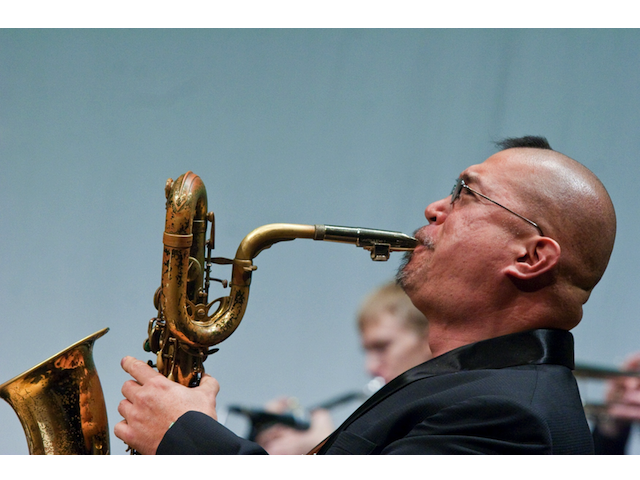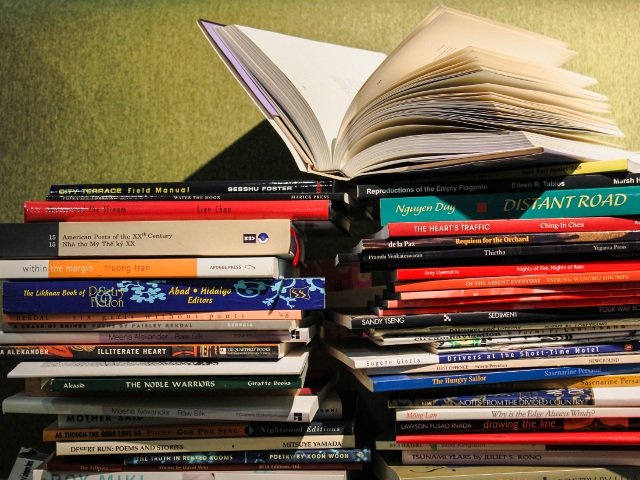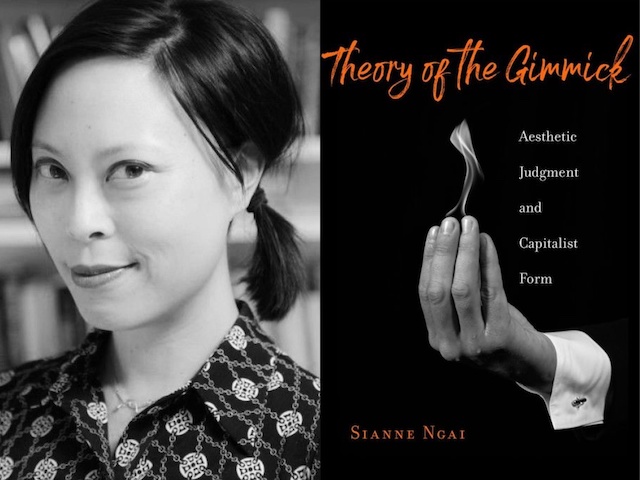“Fred Ho flooded my ears with essential facts about the history of Afro-Asian political and cultural struggle”

August 10, 2014
This essay is part of a Counterculturalists installment commissioned by AAWW to honor the life and legacy of Fred Ho, the radical composer and organizer who passed away in April 2014 after an eight-year battle with cancer. See our introductory post for a full list of contributions.
I was schooled by Fred Ho. In 1997, I met Fred through his work, a performance of his amazing serial action-adventure Journey Beyond the West at the Brooklyn Academy of Music. I was just beginning research into the long, brilliant, intertwined history of African Americans and Asian Americans. Fred’s production of Journey, based on the 16th century Wu Cheng’en novel about the trickster hero Monkey, was like nothing I had ever seen: a raucous, lyrical, agitational broadside for the revolutionary potential of music and theater. When the performance was over I hurried home and wrote to Fred: Could we talk?
From that point forward Fred and I began a series of long conversations in which he literally flooded my ears with essential facts about the history of Afro-Asian political and cultural struggle. About every seven days, a package would arrive containing something from Fred: an article he had published explaining why he didn’t use the term “jazz,” an unpublished history of the Black Arts Movement, or a CD (or three!) from his back catalog.
Before long I was combing through the Fred Ho Papers at the Thomas J. Dodd Research Center at the University of Connecticut, an archive established by Fred and the incredible Roger Buckley, Professor of History and Founding Director of the Asian American Studies Institute at UConn. Soon I was reading a book I still consider one of the most important ever published on political resistance in the United States: Legacy of Liberation: Politics and Culture of Revolutionary Asian Pacific America. Like many of Fred’s projects, Legacy was an act of loving political collaboration assembled by a cadre of activists deeply implanted in communities of struggle. The book has many of the keynotes of Fred’s guerilla scholarship: an epigraph from Lenin, a dedication to Asian Pacific American activists Yuri Kochiyama and Mary Choy, a brilliant essay by Fred on the history of I Wor Kuen / League of Revolutionary Struggle, one of Fred’s first political affiliations; interviews, APA poetry, and reproductions of crucial primary source documents like the 1969 “Program and Rules” of the Maoist and Black Panther-inspired Bay Area Red Guard.
The more I learned, the more I understood that just as Fred was tearing down the walls between stage and audience, past and present in his radical revisions of classical literature, he was using his writing and his ideas to build a bridge: to a world of self-determination for oppressed peoples, to the end of colonialism and its legacy, to a terminus of oppression and exploitation in all its forms. Fred called this idea “revolutionary vision quest.” It was best captured for me by Fred’s founding creed for his Afro-Asian Music Ensemble: “to musically express a vision of unity between the cultural-socio-political struggles of African Americans (the originator and innovators of ‘jazz’) and Asian Americans.” Fred knew that Black and Asian people shared a secret history of struggle and resistance against racism, colonialism and capitalism that the world needed to know. Like his own mentors in the Black Arts Movement, poets and musicians he both venerated and criticized, Fred thought that only history and culture created from the bottom up could make a world where human beings and their ideas could walk without masters:
The culture and Arts of the oppressed owes nothing, needs not be thankful to, the culture and art of the oppressor. What oppressor cultural aspects there are have been refashioned and transformed, and dare we say, violated and miscegenated. This has been the way of the oppressed masses: the field slave, the coolie, the savage, the bandit, the heathen, the guerilla.
Fred’s roll call of those he named “sheroes,” or “womyn-warriors,” like the African American revolutionary Assata Shakur, or the mythic, gender-bending Chinese fighter Fa Mulan, were the protagonists in his dramatic stagings of Afro-Asian liberation. They were the toilers that inspired his toil, the singers of songs for which he was the griot. My favorite Fred Ho is the one always with his ear to the ground for voices of the oppressed: listen to his hole hole bushi, Fred’s beautiful and heart-breaking invocation of work songs by Japanese women cane workers in Hawaii plantations; or Fred’s thirteen minute suite “The Underground Railroad to My Heart,” a hard swinging “anti-bourgeoisie boogie woogie” as Fred described it that is an homage to Duke Ellington, a major influence on Fred’s compositional sensibility, and a phalanx of fighting dispossessed: from Cherokee Indians on the Trail of Tears, to refugees from Haiti after the coup that brought down Jean Aristide.
But the greatest joy for me of knowing Fred was watching his ideas propagate across the world, a hundred flowers of revolutionary hope. In 2008 I was fortunate to be Fred’s co-editor on Afro-Asia: Revolutionary Political & Cultural Connections Between African Americans and Asian Americans. The book was, like most of Fred’s work, a loving collaboration, but he was lead horn. His revolutionary vision is everywhere in it: unlike most academic books, this one combines brilliant scholarly essays by people like Robin D.G. Kelley and Betsy Esch, Diane C. Fujino and Cheryl Higashida, with REAL ART: autobiographical reflections by David Mura and Alexs Pate; a meditation on Asian American and African American writers by Ishmael Reed; poetry by Kalamu ya Salaam, Ishle Park, Maya Almachar Santos and others.
Another major coming out party for Fred’s ideas was his book Wicked Theory Naked Practice: A Fred Ho Reader, nurtured and assembled with care and brilliance by the scholar activist Diane Fujino. Anyone wanting a grand tour of the mind of one of the most important revolutionary artists in American history needs to read this book. It is divided into four sections: The Movement and the Self; Music, Aesthetics, and Cultural Production; Asian American Cultural Theory and Criticism; Wicked Theory, Naked Practice. Wicked Theory is Fred’s omnibus manifesto for how to live a vanguard life of uncompromising commitment. Inside, the book includes speeches, writings and interviews with Fred that map his diasporic mind: from the influence of musical mentors Cal Massey and Archie Schepp, to the emergence of salsa in 1960s New York Puerto Rican communities, to the importance of national self-determination struggles for artists seeking relief from the effects of racism, capitalism and alienation.
Astonishingly, both Afro-Asia and Wicked Theory were published when Fred was already quite ill. Fred’s diagnosis of stage 4 colon cancer in August 2006 only spurred him on further in his fight against injustice. Cancer became Fred’s new metaphor for what ailed not just him but capitalist society. What he called the “conditions of toxicity” that produced human unhealth, from electromagnetic radiation to chemical contamination, became a new base line for understanding his relationship to humanity. As he put it in the on-line Cancer Diary he began keeping after his diagnosis, “The one basic fundamental of capitalism: it is a system that has created the power to feed, clothe, house everyone and to remake or destroy the world; but at the heart of it all, it is a system that creates more problems than it solves.”
From 2006 until his death, those of us who watched Fred die also knew we were being schooled again—in how to live. Fred did not need to draw closer to his life the lovers’ army of friends, caregivers, muses who braided his life; they were already in the fabric. His long-time collaborator, the brilliant librettist Ann T. Greene, became Fred’s amanuensis, sending regular electronic updates on his condition, his moods, his surgeries, his recoveries, his needs. Through it all, Fred loved, despaired—and played. On November 1, 2008, Fred and the Afro-Asian Music Ensemble performed to a packed house at the Purdue Black Cultural Center. Fred pushed himself so hard he had to retire before the set was finished, coughing up blood. In March, 2012, Fred performed his epic “Free New Afrika Boogaloo!” at the Los Angeles Labor / Community Strategy Center. Tribute concerts proliferated like wild flowers for Fred in his last days as people came to celebrate his life and work, or say good-bye, or both.
For those who still want to be in Fred Ho’s company, there are in addition to his books a voluminous catalog of music, youtube videos of Fred’s performances, DVDs of his theatrical productions. Check them out! An endowment in Fred’s name for promising young scholars of music and radical culture has been established at the University of Connecticut. Contributions can be made at to the address below.
For me, Fred’s legacy is best summed up by his own words challenging those who will inhabit the future world for which he fought so brilliantly:
Each young radical must ask him / herself: Am I a revolutionary? How should a revolutionary movement be built? What should I be studying? What more can I learn from the history of past revolutionary groups and movements? How can I transform myself to transform the world? Hopefully, the veterans can share their experiences and be supportive, yet, as Frantz Fanon pointed out, each generation must find its own mission and either fulfill or betray it.
MORE IN THE COUNTERCULTURALISTS TRIBUTE TO FRED HO:
Kanya D’Almeida, “To Walk the Gauntlet of Fire: Remembering A Mentor”
Fred Ho, “From Banana to Third World Marxist”
Fred Ho, “Beyond Asian American Jazz: My Musical and Political Changes in the Asian American Movement”
Marie Incontrera, “All The Colors of Life: A Celebration of Fred Ho”
Diane Fujino, “Fred Ho’s Radical Imagination”



